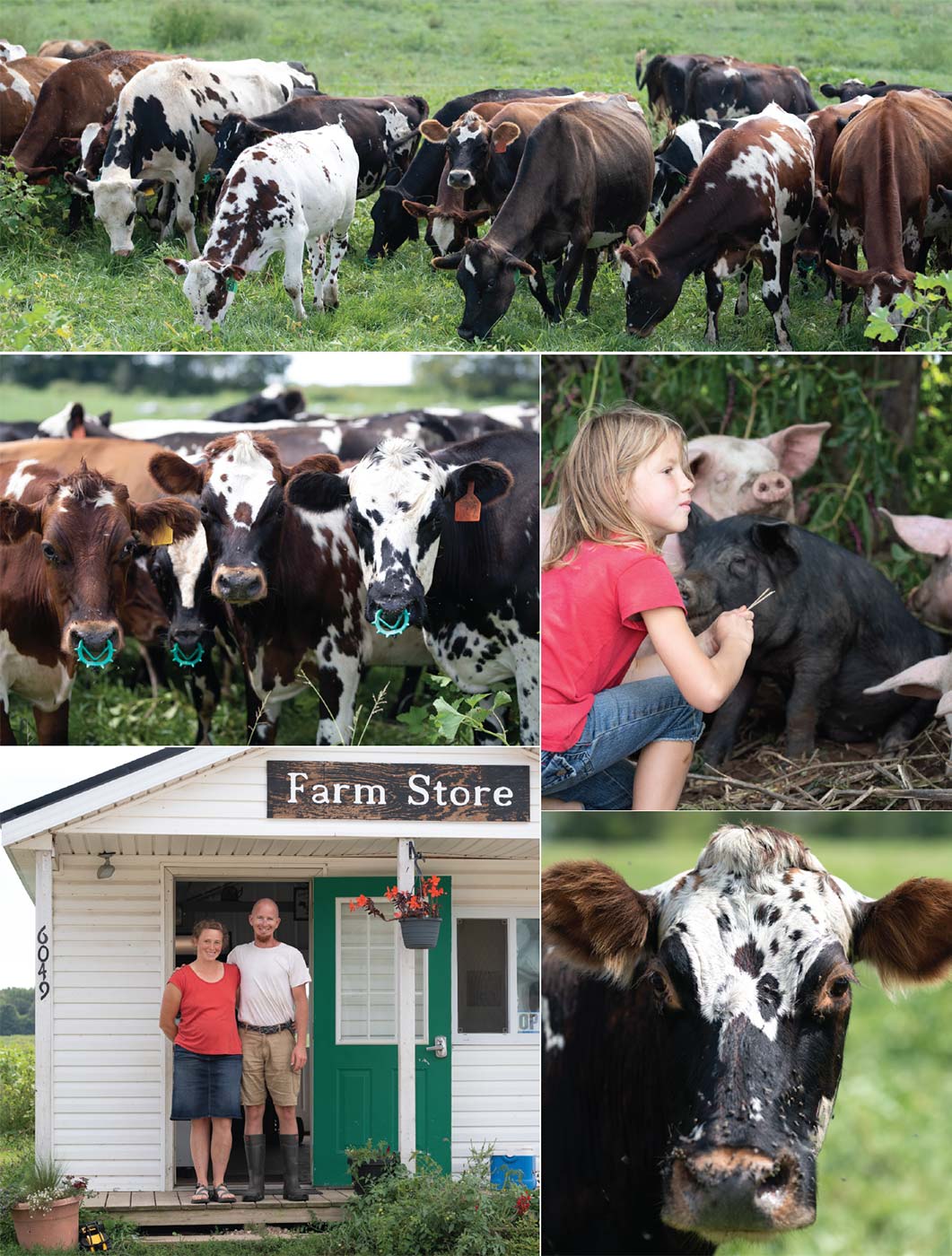Ohio's Dairy Industry
A DAIRY DILEMMA
Milk is a bargain for shoppers at the grocery store, but those low prices are a factor in the decline of Ohio’s dairy industry, once a staple of rural farming communities.
The industry is going through a profound transition as many family dairy farms, facing meager or nonexistent profit margins, choose to cease operations. According to the Ohio Department of Agriculture, more than 650 dairy farms have shut down in the past three years, leaving just under 2,000 operating in the state today.
This systematic contraction impacts not only family farms, but the support industries that rely heavily on milk production for their businesses. Truck drivers, veterinarians and processing plants are feeling the negative impacts as Ohio’s once-extensive network of dairies further consolidate.
For the consumer, low milk prices are a benefit. For farmers, however, the sluggish commodity prices for milk mean they must make tough choices about their futures. Farmers who wish to continue operating must find ways to remain economically viable in an industry forcing many families out of a job they love so dearly.
As farmers look for new alternatives amid industry turmoil, one recourse coming back into vogue is raising cows on pasture. It’s a method that was widely used in the past by American dairies before land prices skyrocketed and commercial feed became more affordable.
ROTATE, GRAZE, REPEAT
The pastures at Sweet Grass Dairy in Fredericktown are singing as you walk through them. The biodiversity is extraordinary. Every step through the lush forage triggers the flush of grasshoppers, while pollinators of all types flutter, buzz and zip from flower to flower. Meadow-loving birds accompany the faint insect drone with their own songs to create a wildlife symphony.
This is not your typical dairy farm.
This 140-acre organic farm nestled in the Knox County countryside about an hour north of Columbus is a permaculture marvel incorporating the very best in regenerative and sustainability principles.
Although small dairies are most susceptible to closing, Sweet Grass Dairy owners Jacob and Elizabeth Coleman are utilizing techniques developed in New Zealand to ensure the farm remains profitable and sustainable. New Zealand has a world-renowned grass-growing culture, where farmers manage land with the specific goal of producing grass. New Zealand’s cool, balmy climate prevents the growing of large amounts of traditional feed rations such as corn, soybeans and wheat. However, that weather is ideal for growing nutrient- dense grass. Farmers in New Zealand produce milk, beef and lamb on a mostly grass-based diet.
A key element of a grass-based dairy is a concept known as rotational grazing. This method involves segmenting a large pasture into smaller paddocks. For dairy cattle, which are docile and mild-tempered by nature, a single strand of electric fence is all that is needed to keep them inside a paddock. A farmer then rotates the livestock from paddock to paddock. At Sweet Grass Dairy, they move the cows two to five times a day.
This ensures that the cows are constantly grazing on the fresh, calorie-dense forage. At the same time it gives the grass in the other paddocks a chance to rest and regenerate. Simultaneously, cows are producing nutrient-rich manure that is dropped along the way. This manure ensures optimal pasture fertility.
Additionally, movement by the cows guarantees that manure is naturally spread across a wide area. Pastures grazed in this manner are healthier and grow back stronger, capable of producing even more food, which in turn yields greater milking production.
Pastures are not a monoculture of a single variety of grass. At Sweet Grass Dairy, the grazing paddocks are a buffet of plant varieties. Red and white clover, dandelions and various grasses such as fescue make up the cows’ grazing options. Cows do not mindlessly graze across a grassy meadow. They are extremely tactical in what they like to eat. Without regular rotation, the cows would overgraze what they like in a pasture, leaving the rest. Over time, both the pastures and the cows would suffer as the pastures lost their biodiversity and the cows were left with fewer options.
Through intensive rotational grazing and careful management of grazing practices, pastures regenerate stronger, healthier and more capable of producing delicious dairy and meat products. This system of management gives farmers greater freedom to make decisions best suited for the land and alleviate costly feed bills as cows get their calories from grass instead of mixed feed rations.
Jacob Coleman credits early adopters to this type of production: “We were influenced a lot by early pioneers of grass based-agriculture like Joel Salatin and try to incorporate those principles in our operation.”
In 2013, the couple started the farm and have been constantly improving the land ever since. This hard-working husband and wife and their five children are dedicated to the land and forging their own path to sustainability. “No two farming operations are alike” he said, and “we use elements of other ideologies, modified to fit the needs for our farm.”
Choosing to go organic is more than just selecting a production method to raise food for consumers. It is a rigid operating procedure that is as much a legal definition as it is a farming practice. Farmers are left with few options to control sickness, parasites and weeds on their farms. They must be creative and flexible as issues arise.

DIRECT FROM FARM TO TABLE
When they first started milking their herd of 30 dairy cows, the Colemans marketed their organic milk through Horizon Organic. Producing milk and marketing dairy products are two totally different disciplines. Often farmers opt to sell their products wholesale to a company, which in turn sells the products to consumers at retail prices. The farmer assumes the risks of production and the retailer assumes the job of marketing the products to consumers. While this system is very practical and efficient, it prevents the farmer from realizing the maximum return on investment.
As their dairy operation began to gain momentum, the Colemans took a gigantic leap and decided to take even more control of their farming operation by marketing their products directly to consumers. This entrepreneurial spirit essentially cuts out the middleman and allows for the Colemans to have a more personal relationship with their customers.
Today, they market more than 80% of their products directly from the idyllic little farm store located on the farm. In true country fashion, the store is run on an honor system and has a regular clientele that visits the farm throughout the year. “Our customers are committed to buying meat and dairy products raised this way,” Jacob Coleman said. “They believe in what we are doing.“ The store allows the Colemans to supply their loyal customers with organic products and gives them a chance to see first-hand how the animals on the farm are raised.
Jacob and Elizabeth have also diversified their farming operation beyond milk and dairy products. They currently offer customers pastured poultry, free-range eggs, and pork products. This allows those who prioritize pastured protein and dairy products to get everything they need with one stop at the farm. Their customers are committed to the meat, cheese, and milk they produce and this creates a steady demand that continuously supports the farm.
Jacob and Elizabeth believe they have developed a farm that is able to withstand outside market pressures and remain viable despite circumstances impacting the dairy industry. However, beyond the financial independence, they are dedicated to how they choose to raise animals for meat and dairy products. Sweet Grass Dairy is truly a farm that inspires enthusiasm and optimism for Ohio’s dairy future.
- If you would like to learn more about Sweet Grass Dairy, sweetgrassdairy.grazecart.com.
If you can’t visit the farm store, you can order meat, cheese and other dairy products online for later pickup at one of several Columbus locations. Find details about this process on the website.




